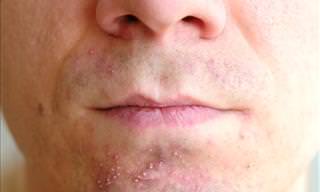Dry and cracked lips are a common phenomenon – especially in winter, but not exclusively. During transitional periods, such as the shift from winter to summer, temperature fluctuations, changes in humidity, and the move from cold, dry weather to hot, arid conditions all place a burden on the sensitive skin of the lips. The cold outdoors, low indoor humidity, sun exposure, wind, and sometimes even the ingredients in lip balms themselves contribute to discomfort, a burning sensation, and occasionally even actual sores.
Moisturizing lip balm may seem like a quick fix, but does it really work? Which lip balms might worsen the condition, and when could dry lips signal a deeper health issue? Dr. Newmann, a dermatology and venereology specialist, sheds light on the matter – explaining why not everything that smells good on your lips is necessarily good for them.
More Than Just a Gimmick: Lip Balm with SPF
One of the most critical components in a lip balm – for winter and especially summer – is sun protection. According to Dr. Newmann, this is nothing short of a medical necessity. “It’s not just a gimmick. A lip balm with high-quality SPF, containing recognized and active UV filters, provides significant protection against UV rays, much like sunscreen for your face. The advantage is that it’s tailored to the lip area – which doesn’t produce natural oils, lacks a thick keratin layer, and is highly sensitive to the sun.”

He explains that such a lip balm prevents not only dryness but also sunburn and cumulative damage that could lead to precancerous lesions. “For the protection to be effective, it’s important to reapply every two hours, especially after eating or drinking,” he advises.
So Why Does Lip Balm Cause Dryness?
Ever feel like your lip balm is supposed to soothe your lips but instead causes tingling, dryness, or even a burning sensation? Dr. Newmann says there’s a clear reason: “Some lip balms contain irritating ingredients – like menthol, camphor, essential oils, or flavor extracts – that can cause local irritation, burning, or dryness, especially in people with sensitive skin.”
Strong dyes and fragrances can also trigger allergic reactions. Therefore, Dr. Newmann recommends opting for a simple-formula lip balm – free of scent, color, or flavor – particularly if you’re prone to dryness, cracking, or sensitivity. If you feel a burning sensation after applying lip balm, it’s a warning sign to stop using it and switch to a hypoallergenic product.
Therapeutic vs. Cosmetic Lip Balm: The Difference Matters
Not all lip balms are created equal. “A therapeutic lip balm is designed for repair, healing, and protection,” Dr. Newmann emphasizes. “It typically contains active moisturizers like shea butter, vitamin E, panthenol, ceramides, or anti-inflammatory agents, and sometimes SPF. In contrast, a cosmetic lip balm focuses on appearance – color, shine, scent – and often contains fewer active ingredients, or even substances that can dry out the lips.”
How do you know what works?
“Read the ingredient list. Look for a lip balm with soothing, hydrating ingredients, free of unnecessary fragrances or dyes, and ideally approved by the Ministry of Health,” advises Dr. Newmann.
How to Keep Lips Soft and Healthy
“If you do these things – choose a therapeutic, hypoallergenic lip balm without fragrance or flavor, prioritize one with SPF and reapply every two hours, avoid licking your lips and products with menthol or camphor, stay hydrated, and perhaps use a humidifier – you can get through both winter and summer with soft, healthy lips,” says Dr. Mohammed Newmann. “If you experience a burning sensation, stop using the product and consult a dermatologist. And if your lips are chronically cracked, it’s worth checking for nutritional deficiencies or a skin condition requiring treatment.”

Lip Balm Addiction? A Common Myth
One of the most well-known urban legends about lip balm is the idea that we become “addicted” to it. According to Dr. Newmann, there’s no medical basis for this claim. “Lips don’t develop a ‘dependency’ on lip balm – they simply lack oil glands and dry out easily. When you stop using lip balm after a long period, the dryness feels more pronounced because you’ve stopped providing the protection they need. It’s not addiction; it’s a lack of defense.”

However, he cautions that using lip balms with irritating or drying ingredients (like alcohol) can create a “dryness cycle” that feeds itself. That’s why it’s crucial to choose a high-quality, soothing product – not one that offers only temporary relief.
Can Dry Lips Signal Something More Serious?
While lips can dry out in winter or summer, persistent dryness might indicate a deeper issue. “If your lips are constantly cracked, with ongoing peeling, bleeding, or recurring sores, it could point to a broader problem,” explains Dr. Newmann.
Possible causes include vitamin deficiencies (especially B2, B12, or iron), reactions to medications, allergies, skin conditions like atopic dermatitis, or even precancerous states. Cracked corners of the mouth (angular cheilitis) might suggest an infection, candida, or immune system dysfunction. “In cases of prolonged dryness that doesn’t respond to basic care, it’s wise to see a dermatologist for a thorough evaluation,” Dr. Newmann recommends.
What Else Can You Do?
Beyond using the right lip balm, certain habits can help. For instance, avoid licking your lips – it may feel instinctive, but it worsens the problem. Saliva evaporates quickly, taking moisture with it and leaving lips drier. Don’t forget to drink water – internal dehydration contributes to dry skin and lips.
 Go to BabaMail
Go to BabaMail

























































